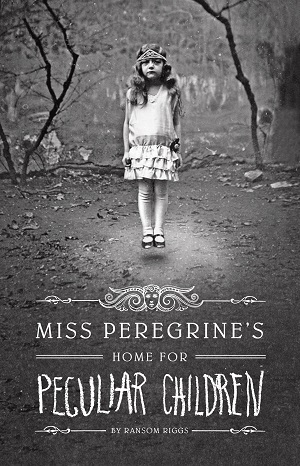- The Good: Peculiar children, magical portals, and monsters in the shadows!
- The Bad: Inconsistent protagonist; decidedly modern prose and dialogue that conflicts with the moody old photographs and setting
- The Literary: Ralph Waldo Emerson references
Jacob grew up on his grandfather’s stories, which seemed magical and worldly for a normal boy in Florida. With time, he comes to think of the stories as only fairy tales, despite the old black and white photographs his grandfather provides for proof. As a teenager, his grandfather becomes paranoid and fitful, not remembering things he should, and seeing things he shouldn’t. After Jacob finds an old letter, he convinces his parents to send him to his grandfather’s childhood home, a British boarding school on a remote island off the coast of Wales.
Miss Peregrine’s Home for Peculiar Children is a very unique young adult fantasy novel, both in that it’s manages to make old familiar tropes feel new, but mostly because of the medium, a combination of fiction and photography. All the photographs are black and white, eerie, and old, and their presence adds a dark mystery to the otherwise straightforward prose. Just as the photographs Jacob’s grandfather provides as evidence of the peculiar life he lived, so do the photographs alongside these pages serve to rouse the imagination of the reader.
While the atmosphere is creepy, I wouldn’t consider it scary. Instead, think of the mystery of first discovering the X-men, with a little help from foggy islands, dilapidated mansions, and U-boats. Yes, I said U-boats, and with WWII as a backdrop (time loops), the author uses a young peculiar Jewish boy to fight monsters, while the rest of the world fights Nazi’s. The first act is a slow mystery, the second an exploration of the new magical world, and the third provides a much-needed chase and battle with the big baddies.
One of the ways this story breaks from the tried-and-true tropes is with the background of the protagonist. Unfortunately, those tropes are there for a reason. A whiny rich boy, heir of a grocery store chain, with two parents that love and care for him, and who wallows in self-pity does not garner the immediately sympathy of, say, an orphan who survives on the streets by their own tenacity. Jacob does have some pretty traumatic stuff happen to him, and he’s diagnosed with anxiety and PTSD, but those traits just sort of evaporate later. On the whole, Jacob does grow as a character, and by the end of the book eventually states that his life was never ordinary, it’s just that he failed to see the extraordinary in it, which is a nice message.
Highly recommended for fans of magical children and portal fantasies!
